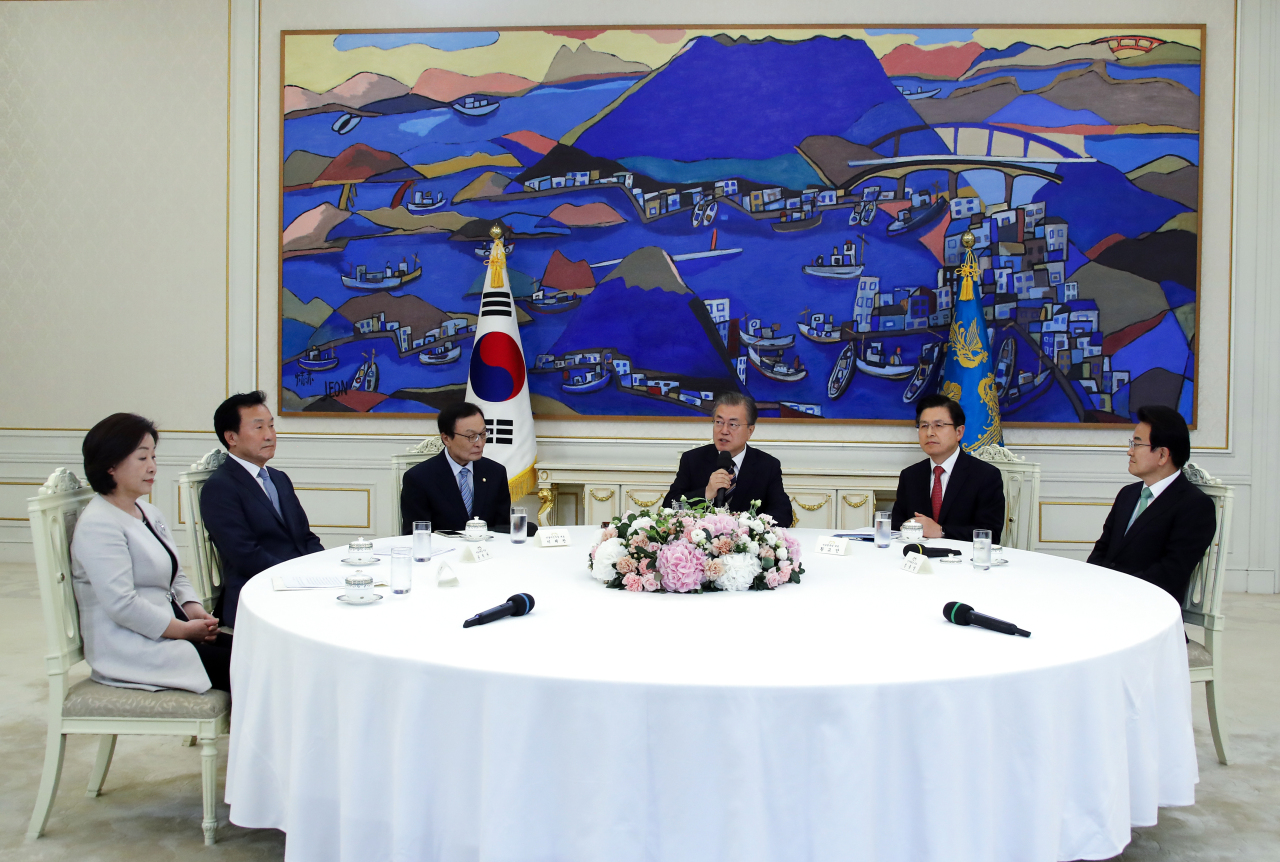Moon, party leaders vow to work together to deal with Japan's economic reprisal
They call for immediate retraction of Japan's export curbs
By Choi He-sukPublished : July 18, 2019 - 20:26
The government and political parties are to establish an emergency cooperation body to respond to Japan’s trade restrictions against South Korea, the parties and the presidential office said Thursday.
The agreement, reached at a meeting of President Moon Jae-in and the leaders of five political parties, called on Japan to immediately withdraw the measures and said that any further trade restrictions would threaten the security of Northeast Asia.
The agreement, reached at a meeting of President Moon Jae-in and the leaders of five political parties, called on Japan to immediately withdraw the measures and said that any further trade restrictions would threaten the security of Northeast Asia.

According to the agreement, the government will draw up practical responses to Japan’s actions while seeking diplomatic means to resolve the situation.
The government and the parties also agreed to work together to minimize damage to local firms and to strengthen the country’s industrial equipment, materials and parts industries.
These and other agreements were reached at the meeting of President Moon Jae-in and the leaders of five parties: Rep. Lee Hae-chan of the ruling Democratic Party, main opposition Liberty Korea Party’s Hwang Kyo-ahn, Bareunmirae Party’s Sohn Hak-kyu, and Reps. Chung Dong-young and Sim Sang-jeung, leaders of the Party for Democracy and Peace and Justice Party, respectively.
Earlier this month, Japan withdrew preferential treatment for South Korean firms importing key industrial materials, such as fluorinated polyimides from Japan.
Japan has cited possible gaps in Seoul’s measures to prevent such materials from flowing into North Korea as reasons for imposing the restrictions. However, the measures have been viewed here as retaliation for the Supreme Court’s decision on forced labor cases.
Last year, the Supreme Court ruled that Japanese firms should compensate Koreans who were forced into working for them during Japan’s 1910-1945 occupation of the Korean Peninsula. The Japanese government and companies have rejected the ruling, claiming that the 1965 treaty between the governments of Korea and Japan had settled the issue.
Going into the meeting, Moon urged the parties’ leaders to work together, saying that the parties and the presidential office working together will strengthen the negotiating position of the government and local firms.
“The most urgent and important matter is how we will respond to Japan’s export curbing measures, and how to decrease our key manufacturing industries’ dependence on Japan for materials and parts,” Moon said.
According to Cheong Wa Dae spokesperson Ko Min-jung, Moon told the parties’ leaders that the comfort women agreement showed him that any agreement on such issues needs to reflect public sentiment.
Seoul and Tokyo signed an agreement on the comfort women issue during the Park Geun-hye administration. However, the agreement, under which the Japanese government was to provide 1 billion yen ($9.7 million) to be used for those subjected to sexual enslavement by the Japanese military, was rejected by many of the victims.
An independent panel launched under the Moon Jae-in administration also found the agreement to be inappropriate.
Meanwhile, main opposition leader Hwang accused the administration of inaction while saying that Japan should retract the measures.
“The government is appealing to the public’s emotions, but emotions and words cannot solve the problem,” Hwang said.
“Ultimately, the most important and core issues should be solved between the leaders of the two countries.”
Hwang went on to stress the need for cooperation with the US, and urged Moon to dispatch a special envoy to Japan and to arrange a Korea-Japan summit.
Hwang also took the opportunity to criticize Moon’s income-led growth economic policy, claiming that the policy was undermining the foundations of Korea’s economy.
Sohn also voiced views that Korea should take the initiative in smoothing relations with Japan, saying that nationalism does not help matters.
Saying that while Korea has the moral high ground in the forced labor issue, Sohn said that Seoul should offer a solution to the matter to give Japan “an opportunity to change directions.”
In contrast, Sim called for a stronger stance on the part of Seoul. She said that should Japan take further trade-curbing measures, Seoul should consider Japan unfit as a security partner, and should reconsider the military intelligence sharing agreement between the two countries.
She added that Seoul should not hesitate to file a complaint against Japan with the World Trade Organization.
By Choi He-suk (cheesuk@heraldcorp.com)







![[KH Explains] Hyundai's full hybrid edge to pay off amid slow transition to pure EVs](http://res.heraldm.com/phpwas/restmb_idxmake.php?idx=644&simg=/content/image/2024/04/18/20240418050645_0.jpg&u=20240419100350)







![[From the Scene] Monks, Buddhists hail return of remains of Buddhas](http://res.heraldm.com/phpwas/restmb_idxmake.php?idx=652&simg=/content/image/2024/04/19/20240419050617_0.jpg&u=20240419175937)

![[KH Explains] Hyundai's full hybrid edge to pay off amid slow transition to pure EVs](http://res.heraldm.com/phpwas/restmb_idxmake.php?idx=652&simg=/content/image/2024/04/18/20240418050645_0.jpg&u=20240419100350)

![[Today’s K-pop] Illit drops debut single remix](http://res.heraldm.com/phpwas/restmb_idxmake.php?idx=642&simg=/content/image/2024/04/19/20240419050612_0.jpg&u=)